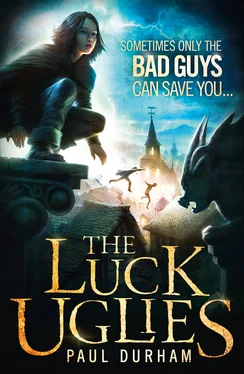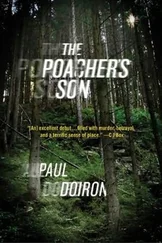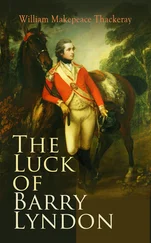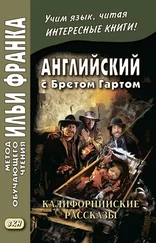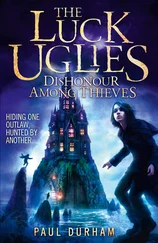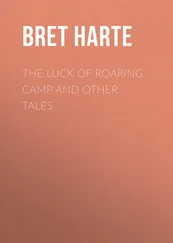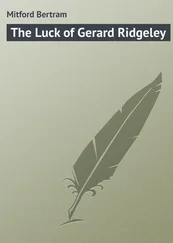“Are you ready?” Folly asked.
Rye nodded. This was going to make the whole trip worthwhile.
“OK,” Folly said. “Stay close to me and try not to draw attention to yourself. My father will be too busy to notice, and nobody else will care that we’re here.”
“Got it,” Rye said.
Folly opened her door and they stepped into the hall. Sound and heat roared from below. The four-storey inn was open from floor to ceiling, with a central staircase leading from one level to the next. Rye and Folly walked to the edge of the railing and peeked down. Hanging from the beamed ceiling, fixed with an anchor chain, was a chandelier fashioned from the sun-bleached skeleton of some long-extinct sea monster. Its bones were covered with hundreds of beeswax candles that bathed the inn in the glow of soft light.
All the tables were filled and people stood shoulder to shoulder at the bars. Barmaids pushed through the crowds, delivering trays of mugs and goblets that seemed to make everyone happier. A huge black shark roasted on a spit over the stone fireplace. Its jaws, filled with sharp teeth, were wide enough to fit a person inside. Every now and then a barmaid would cut off a piece, slap it on a plate, and deliver it to a hungry patron. With each cut, the juices of the shark steak dripped into the fire, sending flames shooting into the air, and everyone would cheer.
“Come on,” Folly said, and they took the stairs down to the second floor.
The second floor was busier than the third. Guests made their way in and out of their rooms, some disappearing behind latched doors. Over the noise of the crowd, Rye could hear music. There were drums, maybe a lute. Rye was spellbound by the festivities. She crossed her legs and leaned her head against the railing, soaking in the sights and sounds.
The Dead Fish drew an unusual crowd. Unlike most villagers, these people looked like they had been places and done things. Gambling was everywhere – drinkers bet on who could empty their mugs the fastest, or who might fit the most spiders in his mouth. A card game was heating up at a table in the corner. A man with slicked-back hair and a small black monkey on his shoulder seemed to be doing most of the winning. The monkey shuffled the cards and collected the bronze bits after every hand the man won. At one point someone accused the monkey of cheating. Insults were traded. Someone got bitten.
Folly’s father, Fletcher, served behind the main bar, which made him the most popular person at the inn. His hands never stopped working and his gap-toothed smile never left his face. He strung grommets, shims and bits on the leather coin belt round his waist as quickly as the customers dropped them on the bar. On the shelf behind him, the bottom chamber of a tall hourglass slowly filled with black sand. Rye had never seen anything quite like it. On what kind of beach could you find black sand?
If Fletcher Flood was the most popular person at the Dead Fish, it seemed to Rye that the man at the Mermaid’s Nook wasn’t far behind. The Mermaid’s Nook was the best table in the house. It was the closest to the main fireplace and it sat higher than the others in a semi-private corner with a view of the entire inn. Folly told Rye it was her favourite because of the beautiful, life-sized mermaid that was carved into the wooden table top.
The man at the Mermaid’s Nook had a short, stubbly beard flecked with grey, and dark hair that was long but not unkempt. His nose, though bent, seemed at home between his cheeks. He had more than a few scars. Several ran through his eyebrows and another across his throat. His eyes flashed with delight, or was it wariness? Rye’s eyes followed the man’s as they scanned the inn, seeming to take inventory of everything in it. His eyes found Rye’s, and she looked away until she felt them move on.
The woman at his table had her back to Rye. Her dress, the colour of fresh cranberries, showed off her soft, white shoulders. Rye watched as every few minutes someone would stop at the Mermaid’s Nook to greet the man and his companion. Visitors would shake his hand, heartily slap his back, or almost timidly touch his shoulder. When he waved or reached across to say hello, Rye could see the green tattoos that began above the leather bracelets criss-crossing his wrists. They snaked their way up his forearms and disappeared beneath his sleeves. His silver rings and the chains round his neck glinted when they caught the light. He seemed apologetic after each visitor left, and he would lean forward and whisper something to the woman at the table.
“Folly, there you are,” said a voice. “Oh. Hello, Rye.”
It was Fifer Flood, the nicest of Folly’s brothers.
“Hi, Fifer,” Rye said.
Fifer was thirteen and, for some reason, Rye always found herself blushing when he was around.
“Folly, be a love and bring these down to Mum, would you?” Fifer asked. He handed her an armful of bar rags. “I need to get back to cleaning room seven. The sword swallower had a terrible mishap. There’ll be no second show this evening, I’m afraid.”
Folly crinkled her nose and took the rags.
“Thanks,” Fifer said. “You two stay out of trouble.”
Rye shadowed Folly’s steps down the last flight of stairs to the main floor of the inn. A young, straw-haired bartender spotted them, but just smiled and waved them over. It was Jonah, a friend of the twins. He was always kind to Rye and Folly and let them sip the honey mead when no one was looking.
“You two up to mischief?” he asked.
Why did everyone always jump to that conclusion?
“No. Well … maybe,” Folly said with a smile. “Don’t tell my dad.”
Jonah pursed his lips and buttoned them with his fingers. “I doubt he’ll notice anyway,” he said. “This is the busiest Black Moon we’ve seen in years. The Bog Noblin chatter has everyone on edge. Folk get thirsty when their nerves are frayed.”
“Are you nervous, Jonah?” Rye asked.
“I’m scared they’ll string me up if we run out of ale. But scared of Bog Noblins? No, not me.” He raised an eyebrow. “Did you come here to talk about them too? Try over there.” He pointed to where a small crowd had gathered round a tall man in a corner.
“Jonah,” Folly said, a hint of conspiracy in her voice. “Has anyone said anything about … Luck Uglies?” Out of habit, she peeked over her shoulder when she said it.
Jonah snorted and tugged the tuft of beard on his chin. “People are saying all sorts of foolish things. We’ve been down that road before. Asking the Luck Uglies to solve your problems is like letting wasps in the kitchen to get rid of your flies. Once the flies are gone, who do you think the wasps will sting?”
He snapped a bar rag at them playfully. Rye and Folly giggled nervously as they moved on.
“What was that supposed to mean?” Rye asked Folly when they were beyond earshot.
“Beats me, but I’m staying out of the kitchen for a while,” she said, and they both giggled again.
Folly and Rye darted between hips and thighs as they worked their way towards the corner Jonah had indicated. They stopped at the smaller side bar where Faye Flood rinsed dirty goblets at a furious pace in a trough of brownish water.
“Here, Mum,” Folly said.
She dropped the stack of dirty rags on the bar.
Faye flipped back the lone streak of grey in her blonde hair, which hung down in front of her face. She gave a quick smile and a wave and returned to her chores. Her face was round and pretty, but Rye noticed that the years of scrubbing had left her hands thick and weathered.
Eventually, they found their way to the corner where a tall, bearded fellow with some miles under his boots was addressing a small crowd of patrons over his mug.
Читать дальше
